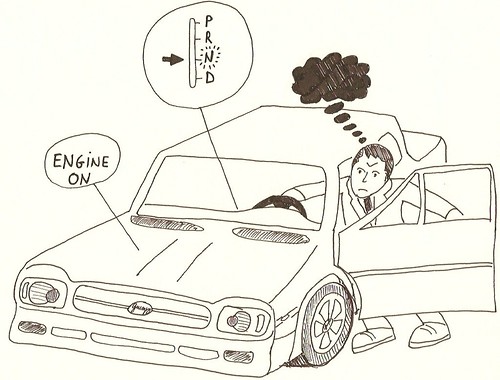Every once in a while I meet bosses and project managers who are very tired and extremely grumpy. You probably have met these kinds of managers too or maybe you are one of them.
They seem to be carrying the weight of the world on their shoulders. They are literally looking after everything and are trying to manage everything into the last detail. They have everything under control and they work very hard to keep it that way.
However, when I look at the results of these managers and compare it to the results of other – less grumpy and less tired – bosses and project managers I see no major differences. So there must be a way to achieve the same level of excellence with less suffering.
In my humble opinion the answer is ‘yes’ and it is all tied to the manager’s maturity level: being able to let go of the control and to empower his people. Let me explain with the simple comparison of the project team and the engine of a car (*).
Grumpy Car Drivers
The grumpy managers I have met so far are action oriented, results driven and demanding so they hire the best people, which gives their project engine a lot of horsepower. Quite soon they kick off the project – the initial combustion to get the engine running. But then – since they want to control everything – they shift the gears into Neutral and they start pushing the car themselves.
Every initiative of a project member to bring the project forward is scrutinized, reworked and criticized until it is completely according to the flavor of the boss. People stop using their brains as pro-active initiatives are discouraged by micromanagement. The engine is not ’empowered’ because of fear of it getting out of control.
The boss complains that he always has to take care of everything – and he does. He also complains that nobody ever takes any initiative – and indeed they don’t; people are discouraged to do so.
The project does not advance as it should, the boss is very tired, the skilled people are also tired of being told what to do in the last detail and all the fuel (i.e. resources: time, money, manpower and attention) are wasted. These managers would be better off with a project bicycle than a project car with a powerful engine.
Turbo Managers
We all know that these bosses should just be shifting that gear into Drive and empower their team of skilled people, consciously making use of time, money, manpower and attention. However, in their minds they are already doing that and they may even be pushing the pedal to the metal – but with the gear shifted in Neutral it only makes a lot of noise. People only do what they are being told because the more our grumpy man uses his reins the less they will use their brains.
Changing the gears of this project car from Neutral to Drive will not require the boss to “do” certain things differently or to “do” more things. Instead it will require the boss to “be” a different driver. The basic question here is: “Who am I being that I always have to take care of everything and that nobody ever takes any initiative?” This type of question refers to Ben Zander’s The Art of Possibility and here is my personal answer to that question…
An empowering manager is not the driver of the project car but the turbo of the engine. Instead of controlling the engine in all its details a turbo is committed to the performance of the engine. The function of a turbo is to aerate the engine when the engine needs extra performance. Turbo managers are committing rather than controlling; they hold themselves responsible for creating the circumstances for better engine performance. So the solution is not a quick fix like changing the oil or the tires, but a transformation from a driver into an engine part.
The Real Driver
You may wonder: “when the project manager is the turbo of the engine – who is at the steering wheel and controlling the pedals?” The customer is. And the manager no longer ‘assumes’ what the customer needs. Again this requires the manager to give away another part of his control: reporting about the delivery part of the project (when the customer does not follow the project car from close by the project manager can report any status he wants).
As you can guess Turbo Management (wow, a new buzzword is born!) requires two fundamental changes:
- The boss is no longer controlling the project like a grumpy maniac but declares himself as an empowering part of the engine;
- The customer needs to be in the driver’s seat – which makes more sense since the customer knows the road and the destination better than the boss or the project manager.
It’s just a thought that came to my mind…
______________
(*) Regular readers of my articles will note that this article builds further on the 2003 article “Communications Antislip Training for Project Managers“.




Pingback: Luc’s Thoughts on Organizational Change » Blog Archive » Seagull Management()
Pingback: Luc’s Thoughts on Organizational Change » Blog Archive » Music and Leadership (part 3)()
Pingback: The Clash of Authority and Influence | Reply-MC()